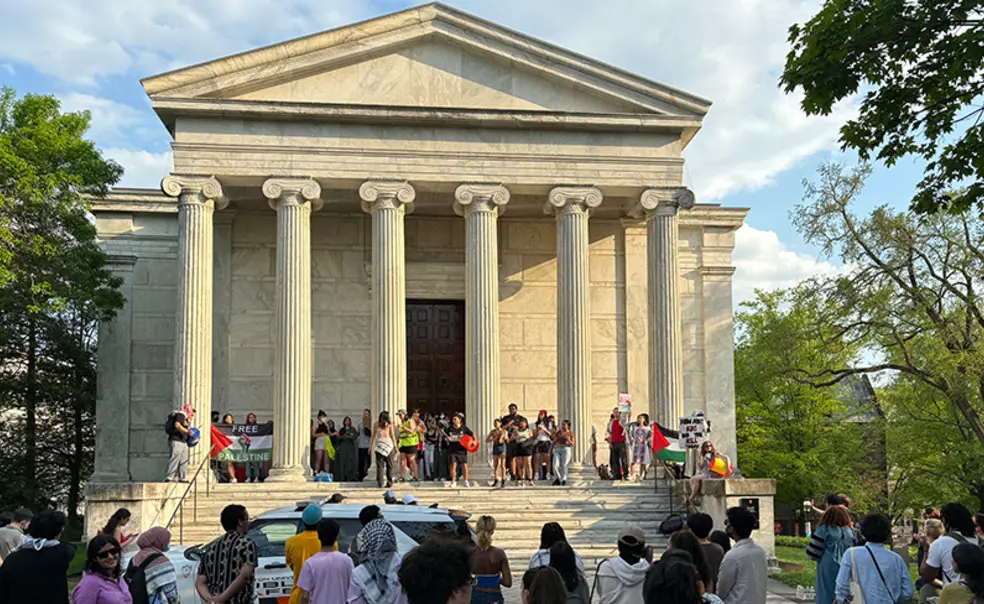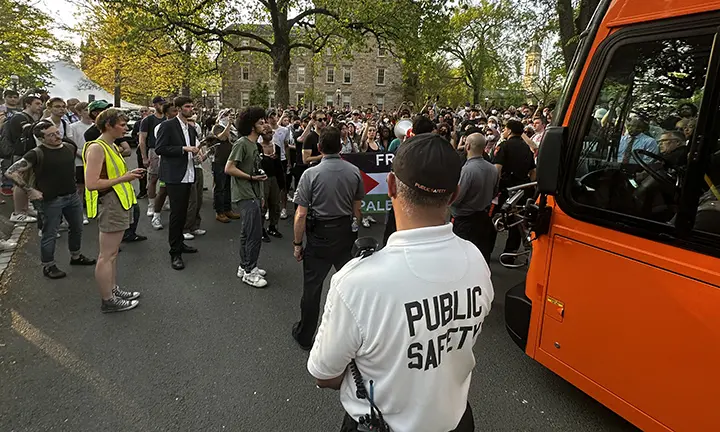Judge Dismisses Charges Against Clio Hall Protesters, Asks for Apology
Judge John McCarthy III ’69 called the protesters’ first apology letter to the University ‘a political manifesto’ and asked that it be rewritten
Update: On July 7, Judge John McCarthy III '69 dismissed all charges with prejudice and ordered automatic expungements of the defendants' records.
All charges against the 13 pro-Palestinian protesters who occupied Clio Hall for a few hours in April 2024 were dismissed without prejudice, meaning the charges can be refiled, at a hearing in municipal court earlier this month. The judge said he’d permanently dismiss the charges and expunge the defendants’ criminal records if they submit a revised apology letter.
The dismissal of the trespassing charges on June 17 came following a motion from municipal prosecutor Christopher Koutsouris, who said he offered the deal in exchange for six hours of community service, which all 13 defendants had already completed. Koutsouris also said he hopes the University receives an apology letter, and when a version was read in court, Judge John McCarthy III ’69 objected to certain language.
The letter needs “to be a written apology that is indeed an apology, and not a political manifesto with references to our constitutional rights to take over Whig-Clio,” McCarthy said. McCarthy also said he was disappointed that none of the defendants took accountability for telling staff in Clio Hall that they had 60 seconds to leave before proceeding to count down.
The 13 protesters occupied Clio Hall, which houses the offices of the Graduate School, on April 29, 2024, amid heightened tension on campus following the October 2023 attack on Israel by Hamas and the ensuing war.
At the time of the occupation, the group consisted of five University undergraduates, six graduate students, one postdoctoral researcher, and a Princeton Theological Seminary student. Several have since graduated. The defendants and their attorney, Aymen Aboushi, appeared at the hearing via Zoom.
According to the version of the letter read in court, it was written “to extend our apology to the staff at Clio Hall for anxiety and stress caused by our acts of protest against the ongoing war and genocide in Gaza. We had hoped that our actions would unify students, faculty, and staff in this cause. … And we sincerely apologize that our actions were not inviting and did not enable you to feel comfortable sitting with us.”
The draft of the letter said that “as a result of our arrest, it has been brought to our attention that our sit-in caused undue and unintended emotional harm to the staff at Clio Hall,” which also bothered McCarthy.
“I don’t know how it would only occur to somebody six months after being charged with trespass. You put some University staff people in a very uncomfortable situation,” McCarthy said.
The letter concluded with “love to this community, for Palestine, for liberation for all.”
Koutsouris and Aboushi did not respond to requests for comment. University spokesperson Jennifer Morrill referred PAW to a 2024 University statement about the case that mentioned a continued commitment to “viewpoint-neutral time, place, and manner rules.”
Koutsouris said at the hearing that the University indicated “that they did not desire these folks to have permanent records, criminal records, as a result of this, which was communicated several times in a letter not only to myself but to the court.”
The 2024 University statement mentioned that as it is solely a prosecutor’s decision whether to proceed or dismiss charges, “we have not asked the prosecutor to ‘drop’ the pending charges.”
The matter is scheduled for administrative review on July 7, according to the court.













No responses yet